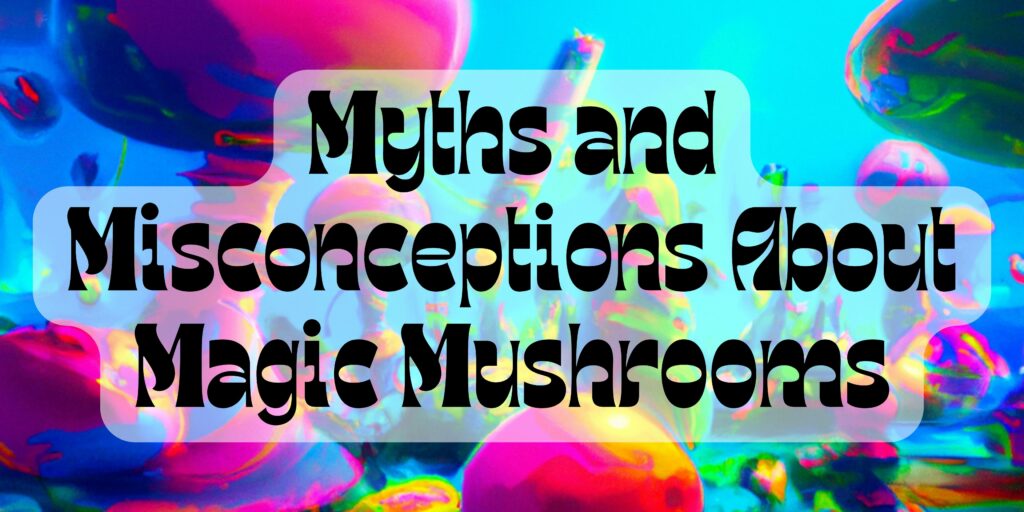Curiosity about the effects of magic mushrooms on the brain has sparked much interest among researchers and enthusiasts alike. But what exactly happens when you consume these mind-altering substances? Let’s dive into the fascinating world of shrooms and explore their impact on the brain.
Psilocybin, the hallucinogen chemical in magic mushrooms, has been found to have profound effects on our brain cells. Research suggests that while under the influence of shrooms, our brain takes new pathways, activating previously unexplored networks. This is made possible through the interplay between neuron activity and the release of neurotransmitters in the brain.
Understanding the effects of shrooms on the brain may hold valuable insights for the treatment of neuropsychiatric disorders such as depression and addiction. By unraveling the mysteries of shrooms, we can unlock the potential of these substances for therapeutic applications.
Key Takeaways:
- Psilocybin in magic mushrooms can reshape brain cells and activate new neural pathways.
- Shrooms tap into previously unexplored networks in the brain through the interdependency of neuron activity and neurotransmitter release.
- Research on the effects of shrooms may have implications for treating neuropsychiatric disorders like depression and addiction.
- Further exploration and understanding of shrooms’ effects on the brain are necessary for unlocking their therapeutic potential.
The Neuroplasticity of Psychedelics: Enhancing Brain Connectivity
Psychedelic substances like psilocybin, LSD, and ayahuasca have been found to have profound effects on the brain’s neuroplasticity. Neuroplasticity refers to the brain’s ability to change and adapt in response to new experiences or environmental input. Research indicates that psychedelics can stimulate the growth of new neural connections and increase the size of growth cones, which are essential for brain cells to establish connections with each other.
Studies have shown that psychedelics can enhance brain connectivity by promoting the formation of new synapses, the junctions between nerve cells. These substances can also facilitate the reorganization of existing neural networks, leading to novel and diverse patterns of brain activity. The enhanced connectivity observed during psychedelic experiences is thought to foster enhanced introspection, creativity, and openness to new ideas.
Preliminary studies have suggested that psychedelics can lead to long-lasting changes in brain connectivity. It is hypothesized that the altered brain connectivity induced by these substances may underlie their therapeutic potential in treating mental health conditions such as depression, anxiety, and post-traumatic stress disorder (PTSD). However, more research is needed to fully understand the long-term effects and mechanisms of psychedelic-induced neuroplasticity.
The Effects of Psilocybin on Brain Activity
Psilocybin, the active component in magic mushrooms, has been found to significantly affect brain activity. Imaging studies using functional magnetic resonance imaging (fMRI) have shown that psilocybin alters activity in key brain regions involved in emotional processing, self-reflection, and perception. These changes in brain activity are believed to underlie the profound sense of interconnectedness, altered perception of time, and ego dissolution experienced during a psychedelic trip.
| Brain Region | Effects of Psilocybin |
|---|---|
| Default Mode Network (DMN) | Decreased activity, leading to a dissolution of the self and a sense of unity with others and the environment. |
| Visual Cortex | Increased activity and enhanced visual perception, resulting in vivid and hallucinatory experiences. |
| Anterior Cingulate Cortex | Altered emotional processing and increased empathy, potentially contributing to the therapeutic effects of psilocybin. |
The specific effects of psilocybin on brain activity may vary depending on the individual, set (mindset and expectations), and setting (environment) of the psychedelic experience. The therapeutic potential of psilocybin and other psychedelics lies in their ability to induce temporary alterations in brain connectivity and activity patterns that can lead to profound and transformative experiences.
Lion’s Mane Mushrooms: Improving Brain Cell Growth and Memory
The remarkable effects of Lion’s Mane mushrooms on brain cells and memory have caught the attention of researchers and health enthusiasts alike. Scientifically known as Hericium erinaceus, these mushrooms have been used in traditional medicine for centuries, and recent studies have shed light on their potential benefits for brain health.
Compounds isolated from Lion’s Mane mushrooms have been found to promote the growth of brain cells, known as neurons. These compounds stimulate the development of neuron projections, which are essential for establishing connections with other neurons in the brain. By enhancing the growth and connectivity of brain cells, Lion’s Mane mushrooms hold exciting potential for improving cognitive function and memory.
Research has shown that Lion’s Mane mushrooms may have a particular impact on individuals with neurodegenerative cognitive disorders, such as Alzheimer’s disease. The neurotrophic effects of these mushrooms have been found to stimulate the regeneration of damaged brain cells and potentially slow down the progression of cognitive decline.
The Memory-Enhancing Effects of Lion’s Mane Mushrooms
One of the most intriguing aspects of Lion’s Mane mushrooms is their ability to enhance memory. Multiple studies have demonstrated the memory-boosting effects of Lion’s Mane extract or supplementation.
“In a study published in 2009, researchers found that Lion’s Mane supplementation improved recognition memory in mice. Another study involving older adults with mild cognitive impairment showed that daily consumption of Lion’s Mane extract for 16 weeks led to significant improvements in cognitive function, including memory and attention.”
These findings suggest that Lion’s Mane mushrooms may hold promise as a natural and effective way to support cognitive function and memory in both healthy individuals and those experiencing cognitive decline. However, further research is needed to fully understand the mechanisms behind these effects and to explore their potential therapeutic applications.

The Potential of Lion’s Mane Mushrooms in Brain Health
While Lion’s Mane mushrooms show promise in improving brain cell growth and memory, it’s important to note that they are just one piece of the puzzle when it comes to overall brain health. A holistic approach that includes a balanced diet, regular exercise, and other healthy lifestyle habits is key.
Additionally, individual responses to Lion’s Mane mushrooms may vary, and it’s recommended to consult with a healthcare professional before incorporating any new supplements into your routine. They can provide personalized guidance based on your specific health needs and goals.
In conclusion, Lion’s Mane mushrooms offer a fascinating avenue for exploring the enhancement of brain cell growth and memory. With their neurotrophic effects and potential therapeutic applications, these mushrooms hold promise in addressing neurodegenerative cognitive disorders and supporting cognitive function in healthy individuals. However, further research is needed to fully characterize their effects and optimize their use for brain health.
The Limitations of Neuroplasticity: Age and Context Matter
Neuroplasticity, the brain’s remarkable ability to change and adapt, has captivated researchers and sparked hope for unlocking new possibilities in brain function. However, it is important to recognize that neuroplasticity has its limitations, which become more pronounced as we age. As we grow older, our brain’s ability to rewire itself diminishes, influencing our cognitive abilities and overall brain function.
Age-related changes in the brain can manifest in various ways. For example, the volume of the brain’s gray matter, which consists of neurons, decreases over time. This reduction in gray matter can impact memory, attention, and cognitive processing speed. Additionally, the brain’s white matter, responsible for connecting different brain regions, may experience structural changes that affect communication between neurons.
While psychedelic substances like psilocybin have shown promise in enhancing neuroplasticity, they cannot reverse the aging process or make the brain behave as if it were younger. Instead, their potential lies in harnessing the remaining plasticity in the adult brain and exploring new pathways of connectivity. It is crucial to manage expectations and understand that the benefits of neuroplasticity in adulthood primarily involve retaining accumulated knowledge and experiences.
Moreover, the effects of psychedelics and enhanced neuroplasticity can be influenced by individual susceptibility and external factors. The context in which a psychedelic experience takes place, including set and setting, can significantly impact the outcome. Factors such as mindset, environment, and support play a role in shaping the effects of psychedelics on neuroplasticity and brain function. Therefore, it is imperative to approach these substances with caution and under appropriate medical guidance.
| Age | Limitations of Neuroplasticity |
|---|---|
| Younger age | Greater neuroplasticity and ability to adapt to new experiences |
| Adulthood | Diminishing neuroplasticity with age; retains accumulated knowledge and experiences |
| Older age | Reduced neuroplasticity; potential decline in cognitive abilities |
Understanding the Effects of Shrooms on the Brain: A Complex Picture
Research on the effects of shrooms on the brain reveals a complex and fascinating story. The active compound in magic mushrooms, psilocybin, has been found to have profound effects on brain cells and neural pathways. It can reshape brain cells and activate new pathways, leading to the exploration of different networks. This neuroplasticity is crucial for the psychedelic effects of shrooms.
Psychedelics, including shrooms, have shown promise in enhancing neuroplasticity and treating conditions such as depression and PTSD. By stimulating the growth of new neural connections and increasing the size of growth cones, shrooms can potentially enhance brain connectivity. However, it’s important to note that the effects of shrooms on the brain are influenced by various factors, including individual experiences, age, and context.
Another mushroom worth mentioning is lion’s mane. Compounds found in lion’s mane mushrooms have been found to promote the growth of brain cells and enhance memory. These compounds stimulate the extension and connection of neuron projections, which play a vital role in brain function. The neurotrophic effects of lion’s mane mushrooms hold potential for treating neurodegenerative cognitive disorders like Alzheimer’s disease.
The effects of shrooms on cognitive functioning and brain chemistry are still being explored. While research has provided valuable insights, further studies are needed to fully understand the mechanisms behind these effects and to explore their potential therapeutic applications. The complexity of the interaction between shrooms and the brain emphasizes the need for ongoing research and careful consideration of all factors involved.
FAQ
What does psilocybin, the hallucinogen chemical in magic mushrooms, do to the brain?
Psilocybin can reshape brain cells and activate new neural pathways, leading to the exploration of different networks in the brain.
How do psychedelics enhance neuroplasticity?
Psychedelic drugs such as psilocybin, LSD, and ayahuasca have the potential to stimulate the growth of new neural connections and increase the size of growth cones, which are essential for brain cells to establish connections with each other.
Can lion’s mane mushrooms improve brain cell growth and memory?
Yes, compounds isolated from lion’s mane mushrooms have been found to promote the growth of brain cells and enhance memory.
Does neuroplasticity have limitations?
Yes, neuroplasticity diminishes with age, and while psychedelics can enhance neuroplasticity, they cannot reverse the aging process or make the brain behave as if it were younger.
Are the effects of shrooms on the brain influenced by individual experiences and context?
Yes, the effects of psychedelics and enhanced neuroplasticity can be influenced by individual susceptibility and external factors, making them a complex area of study.




